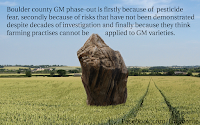On the GMO Phase-out in Boulder County
Introduction
 |
| Right: Image I made to accompany this article. Note that there is a concise summary in it. |
I was alerted to a news article from Boulder County, titled "Elise Jones and Deb Gardner: GMO phase-out is faithful to Boulder County values. The two names are the authors. Elise Jones is an "important environmental advocate" and has opposed GMOs on open spaces since 2003. Deb Gardner, from what I can find, is more limited but does note environment on her website. From this, I would suggest that Elise Jones has a preconceived opinion and Deb Gardner is liable to join in.
My initial prediction about the contents of this article were immediately confirmed. While attempting to pose as reasonable commissioners, a number of anti-GM points are reiterated that do not represent the science, while "natural" products are held up as the shining example of good practise, quickly showing their true colors by speaking of both these and "organic" products interchangeably.
Edit: With the final decision nearing, farmers in Boulder country are organising a last effort under #BoCoFarmers.
Contents
Apparently, they reversed a 2011 policy that allowed the planting of GMO corn and sugar beets on county-owned croplands. Back then, the policy that was requested in 2008 by open space farmers was accepted unanimously by the commissioners.
The authors attempt to appear reasonable by stating that they do not believe in the blanket statement that genetic engineering is inherently harmful. They note that in "some cases", "benefits could outweigh potential risks". What risks?
Their concern is apparently in supporting a cropping system that involves seeds partnered with "toxic pesticides". Apparently, they think that GMOs prohibit integrated pesticide management, thus leading to the continued use of "synthetic pesticides". Of course, the scientific evidence that GMOs reduce pesticide use by 37%, increase yields by 22% and farmer profits by 68% is not mentioned.
Their concern is apparently in supporting a cropping system that involves seeds partnered with "toxic pesticides". Apparently, they think that GMOs prohibit integrated pesticide management, thus leading to the continued use of "synthetic pesticides". Of course, the scientific evidence that GMOs reduce pesticide use by 37%, increase yields by 22% and farmer profits by 68% is not mentioned.
Let us note the ideological bias inherent to this notion. Any farming practice available to a non-GM variety is available to the GM variety. However, the GM version has traits that can aid, leading to the above increase in yield and profit, and decrease of pesticide use. Integrated pesticide management can be combined with GMOs, and would increase the benefits even more.
Next, they speak of Glyphosate. They note that, as the most widely used pesticide it results in resistant "superweeds" and the use of more toxic alternatives. This, I must emphasise, is utter bollocks. Superweed is a fear-mongering term that does not adequately describe the phenomenon. The concept here is that evolution by natural selection causes resistant-traits to become dominant in the weed population. However, that is resistance against a specific management strategy, so changing strategy is sufficient to take care of the problem. There has been no increase in "superweed" occurance. In fact, the pesticide strategy applicable to resistant-trait GM crops should result in less of these weeds. Normally, a farmer has to apply pesticides every so often. For the sake of the argument, we'll say he sprays 5 ml of pesticide ten times for a specific crop (from planting to harvest). Now, with a resistant-GM crop, the same farmer sprays 10 ml per application but only three times. As a result, the earlier use of 50 ml of the pesticide is reduced to 30. Furthermore, because of the higher application, the weeds are obliterated completely, where the earlier smaller applications left some weeds out there, allowing for adaption. Adaption is hard if you're dead.
Suppose this results in a resistant-weed anyway. What happens? Well, just as with any other variety of crops, a pesticide that doesn't work is a bit useless. So, you survey the damage - a few plants can be manually removed, but a lot of plants generally requires a different pesticide application. Nothing is amiss.
We continue with the story of ill-supported myths. Many GMO seeds are presoaked in neonicotinoids! That is not limited to GMO seeds, but the way neonicotinoids are applied. There is very little wrong there. Of course, they mention the bee/pollinator die-off, in which "neonicotinoids" are "implicated". First, let us note how incredibly weak this argument is; not only is the premise of neonicotinoid soaking limited to GMO seeds wrong, but the reason why this would be a problem is merely "implicated". By now, we know that if you care about bees you should look past neonicotinoids.
Following their fear-mongering, they now turn to shining solutions. First, they describe an "emerging topic at the COP21" climate talks, the potential of regenerative agriculture to sequester carbon and remove GHG. However, this is a farming practise and as such it can also be performed with GMOs, to even greater benefit.
Subsequently, we find the most ironic practise. They note that some GMO proponents argue the environmental superiority of GMOs because it enables "no-till" cultivation, but that this practise has been piloted successfully for organic systems. Note that suddenly we're talking organic instead of non-GMO agriculture. Either way, their argument here is that a farming practise for GMOs can be applied to organic farming, without realising that the same is true for any organic farming practise.
Finally, they remark that Boulder County should expand its work with "natural food companies, grocery stores, restaurants, schools and others to create new markets for open space farmers, ensuring their financial success and increasing access to local healthy food". They attempt to sneak in the common myth in the final part of that sentence, namely that organic food is healthier.
Rebuke
As we've seen above, the commissioners are apparently ill-informed of the differences between GMO and organic farming practise, seeing them as a dichotomy. Let me make this rather clear. GMOs are a crop variety. Sustainable farming relates to farming practises that reduce environmental impact, pollution and preserve soil integrity. Organic refers to a specific marketing label that focuses on things being "natural" rather than any measurable unit of sustainability or health.
Furthermore, it seems that they need to be informed of the myths surrounding organic farms. First off, they do use pesticides. They are not demonstrably healthier. It is not better for the environment. You can combine practises.
I do not know where they performed their "extensive research", nor what the "11 hours of stakeholder meetings" and "8 hour public hearing" were about. I do know the county could've saved a lot of money by giving Dr. Kevin M. Folta a call, or perhaps turning to the facebook pages of Mommy, Phd; The Credible Hulk; Destroyed by Science and other evidence-based activists that deserve all the praise they can get.
I also want to remark once more on their tentative formulation of "potential risks" in GMOs that are used as an argument. There is a principle in ethics called the precautionary principle. In principle, pun intended, it deals with the ethics of situations where the science isn't in. A new technology hasn't been tested and the ethics surrounding it are murky at best. The precautionary principle simply states that you have to take preventative action in the face of uncertainty, that the burden of proof lies with the proponents and that you should explore alternatives. The paper above additionally notes increasing public participation, directly contradicting the formulation by Dr. Max More, which emphasises risk assessment based on science rather than popular perception.
The question is whether or not the principle still applies. For GMOs, we could introduce the blanket version and the specific version. The blanket version would be about inherent danger in the technique, but this hasn't been found in the 30 odd years we have had the technology. The specific statement is for each GMO individually, and has resulted in the widespread practise of investigating the acceptance of a GM variety on a per-case basis, as it should be. If you remember, I wrote about this earlier when Norway attempted to see if the documentation for Brazil would be sufficient for acceptance under the European Union guidelines (they weren't). I think it is very clear that the precautionary principle is satisfied by the legislation of the EU and many other countries. If it is not, then perhaps you should file to change the legislation rather than target a specific application.
Conclusion
While the authors clearly show some talent as politicians, they do not display such as scientists or policy makers. The given reasoning is that common to organic echo chambers, with the clearest indication being the notion that organic farming practises cannot be used on GM varieties, a notion so far removed from common sense that it is to the utter embarrassment of Boulder County.
However, I'm glad that, in their ideological decision to remove GMOs and enforce organic farming practises on farmers renting county-land, they at least decided to make a multi-year transition to enforced organic farming.


